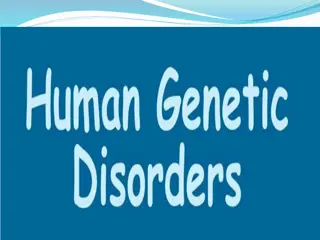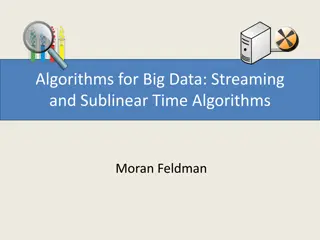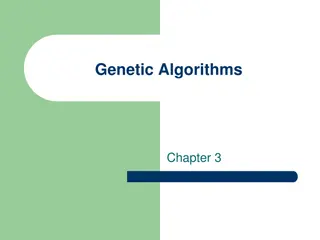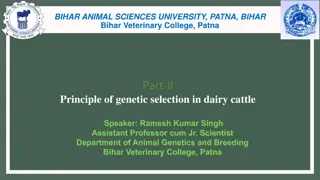Genetic Algorithms in Energy Management for Smart Grids
Genetic Algorithms (GAs) are an optimization technique inspired by Darwinian theory, developed at the University of Michigan. GAs excel in searching for optimal solutions efficiently by intelligently selecting variables. They are particularly useful in solving complex problems that are NP-Hard. This
1 views • 30 slides
Overview of Human Genetic Disorders
Human genetic disorders encompass a range of conditions, from recessive disorders like cystic fibrosis to dominant disorders such as Huntington's disease. Examples include cystic fibrosis, Huntington's disease, and sickle-cell anemia. Understanding genetic disorders involves research and awareness o
1 views • 10 slides
Near-Optimal Quantum Algorithms for String Problems - Summary and Insights
Near-Optimal Quantum Algorithms for String Problems by Ce Jin and Shyan Akmal presents groundbreaking research on string problem solutions using quantum algorithms. The study delves into various key topics such as Combinatorial Pattern Matching, Basic String Problems, Quantum Black-box Model, and mo
1 views • 25 slides
Genetic Engineering: From Basics to Applications
Genetic engineering involves altering the genetic material of organisms to achieve desirable traits. This process entails cutting out specific genes from one organism and transferring them to another. In medicine, genetic engineering finds applications in gene therapy, hormone production, and vaccin
1 views • 12 slides
Genetic Markers in Molecular Mapping
Genetic markers play a crucial role in gene mapping within molecular biotechnology. They are fragments of DNA associated with specific genomic locations, aiding in identifying DNA sequences and analyzing genetic variation. Various types of genetic markers such as RFLP, SSR, and SNP offer insights in
1 views • 26 slides
Improving Microbial Productivity and Characteristics for Industrial Applications
Efforts to enhance the productivity of natural isolates for commercial products involve genetic modifications through mutation, genetic recombination, and genetic engineering techniques. Desired characteristics include genetic stability, efficient production, versatility in carbon sources, and ease
3 views • 25 slides
Combining Graph Algorithms with Data Structures and Algorithms in CSE 373 by Kasey Champion
In this lecture, Kasey Champion covers a wide range of topics including graph algorithms, data structures, coding projects, and important midterm topics for CSE 373. The lecture emphasizes understanding ADTs, data structures, asymptotic analysis, sorting algorithms, memory management, P vs. NP, heap
3 views • 38 slides
Bacterial Transformation in Molecular Biology
Transformation in molecular biology is a process where genetic material is altered by the uptake of exogenous DNA. It involves the direct incorporation of genetic material into a cell, leading to genetic changes. This phenomenon was first demonstrated by Frederick Griffith in 1928. The process of tr
16 views • 25 slides
Genetic Counselors and the NSGC
Genetic counselors play vital roles in healthcare by assisting patients with genetic conditions, advocating for their needs, educating providers, conducting research, and influencing public policy. The National Society of Genetic Counselors (NSGC) supports genetic counselors in their professional en
4 views • 12 slides
Randomized Algorithms: A Deep Dive into Las Vegas and Monte Carlo Algorithms
Randomized algorithms incorporate randomness into computations, with Las Vegas algorithms always providing the correct answer but varying in time, while Monte Carlo algorithms occasionally give wrong answers. Quick Sort is a classic Las Vegas algorithm that involves pivoting elements for sorting. Ch
4 views • 21 slides
Genetic Carrier Screening for Recessive Disorders by GENDIA, Antwerp, Belgium
Explore the world of genetic carrier screening offered by GENDIA in Antwerp, Belgium. Learn about prenatal screening for various genetic disorders, including Down syndrome and severe monogenic disorders. Discover the frequency of common recessive disorders and the severity of genetic diseases. Uncov
0 views • 17 slides
Distributed Algorithms for Leader Election in Anonymous Systems
Distributed algorithms play a crucial role in leader election within anonymous systems where nodes lack unique identifiers. The content discusses the challenges and impossibility results of deterministic leader election in such systems. It explains synchronous and asynchronous distributed algorithms
2 views • 11 slides
Mathematical Analysis of Algorithms in CMPE371 - Fall 2023-2024
Explore the mathematical analysis of algorithms in CMPE371 for Fall 2023-2024, focusing on non-recursive and recursive algorithms. Learn how to analyze non-recursive algorithms by deciding on input size parameters, identifying basic operations, and simplifying summations. Dive into recursive algorit
2 views • 31 slides
The Key Articles of the Nagoya Protocol on Access to Genetic Resources and Benefit-Sharing
The Nagoya Protocol aims to promote fair sharing of benefits from genetic resources utilization for conservation efforts. It encompasses access, technology transfer, funding, and respect for rights over resources and technologies. The protocol applies to genetic resources, traditional knowledge, and
2 views • 19 slides
Pseudodeterministic Algorithms and Their Application in Search Problems
Pseudodeterministic algorithms provide a unique approach to the search problem associated with binary relations, offering an error reduction technique while sacrificing the ability to approximate the average value of a function. By introducing m-pseudodeterministic and pseudo-pseudodeterministic alg
1 views • 6 slides
Comprehensive Algorithms for Cytogenomic Testing in Hematologic Malignancies
This document outlines clinical algorithms for the genetic evaluation of chronic lymphocytic leukemia (CLL), myelodysplastic syndromes (MDS), aplastic anemia, and idiopathic acquired aplastic anemia. It provides detailed protocols for genetic testing, including SNP array karyotyping, cytogenetic and
0 views • 8 slides
Evolutionary Algorithms in Computer Science
Evolutionary algorithms, particularly genetic algorithms, simulate natural evolution to optimize parameters and discover new solutions. By creating genomes representing potential solutions and using genetic operators like mutation and crossover, these algorithms populate a search space, conduct loca
0 views • 33 slides
Exploring the Role of Algorithms in Game Design
Delve into the world of algorithms in game design, from understanding the fundamental concept of algorithms to their pervasive presence in various aspects of gaming, such as military simulations, medical simulations, and gameplay mechanics. Explore how algorithms shape experiences in different types
0 views • 10 slides
Evolutionary Computation and Genetic Algorithms Overview
Explore the world of evolutionary computation and genetic algorithms through a presentation outlining the concepts of genetic algorithms, parallel genetic algorithms, genetic programming, evolution strategies, classifier systems, and evolution programming. Delve into scenarios in the forest where gi
0 views • 51 slides
Genetic Algorithms: Modeling and Optimizing Biological Systems
Explore the concept of genetic algorithms in the context of modeling and optimizing biological systems, as discussed in the lecture by Joel Grodstein at Tufts University. The content delves into the challenges of optimization, the immense number of potential choices, and the role of genetic algorith
1 views • 24 slides
Overview of HL7 V2 Genetics Messaging and LOINC Genetic Testing Codes
This content delves into the proposed HL7 V2 genetics message, NLM forms builder, UCUM validator, and the current state of genetic testing codes in LOINC. It discusses the types of molecular genetic tests present in LOINC and the evolution towards newer genetic tests. The content also covers how LOI
0 views • 21 slides
Genetic Algorithms: Nature's Optimization Technique
Genetic algorithms (GAs) are a powerful search technique inspired by evolutionary biology. Starting with a population of randomly generated individuals, GAs evolve solutions through generations by evaluating fitness, selecting, and modifying individuals. The process continues until a satisfactory ou
0 views • 52 slides
GWAS: A Brief Overview of Genetic Association Studies
GWAS, or Genome-Wide Association Studies, are a method used to map genes associated with traits or diseases by analyzing genetic markers throughout the genome. This process involves statistically testing the association between SNPs and traits using regression or chi-squared tests in a hypothesis-fr
1 views • 19 slides
Genetic Architecture of Smoking Behavior Traits: Meta-Analysis Insights
Exploring the genetic basis of smoking behavior-related traits through a meta-analysis combining data from three large consortia across 58 different cohorts/datasets. The study investigates genetic variants associated with cigarettes per day, pack years, smoking initiation, and smoking cessation. Ov
1 views • 34 slides
Evolutionary Computation Explained Through Genetic Algorithms
Explore the world of evolutionary computation with a focus on genetic algorithms. Learn how non-classical search and model evaluation contribute to maximizing objective functions. Delve into the detailed process of generating and evaluating populations, selection techniques, and the key aspects of g
0 views • 22 slides
Genetic Test Findings Overview
The content provides a detailed overview of genetic test findings for various cases, featuring specific genetic mutations and conditions. Each entry includes genetic variants, protein changes, and relevant details. The accompanying images offer visual representations of the genetic data and associat
0 views • 190 slides
BCH 462- Biotechnology & Genetic engineering [Practical]
Explore the practical application of restriction enzymes and genetic polymorphism in biotechnology and genetic engineering labs. Learn about the differences in DNA sequences among individuals, the role of restriction enzymes in creating genetic variation, and the impact on DNA fragment sizes. Discov
0 views • 22 slides
National Database for Genetic Disorders Initiative
Investigators at Virtual University of Pakistan are launching an initiative to develop a national database for human genetic disorders. The project aims to collect data from over 1000 families affected by different genetic disorders, offering an opportunity for undergraduate final year students in b
0 views • 32 slides
Algorithms for Big Data: Streaming and Sublinear Time Algorithms
Motivation behind big data research, exploration of sublinear time algorithms, and analysis of algorithms for diameter approximation and property testing. The talk delves into theoretical algorithms for big data problems, focusing on streaming and sublinear time algorithms, showcasing classical exam
0 views • 30 slides
What is a Genetic Counselor and Their Role in Healthcare
Genetic counselors are specialized healthcare providers who offer personalized care for genetic health. They work in various settings and help individuals understand genetic risks, develop personalized medical plans, make informed decisions about testing, and provide support. Reasons to see a geneti
0 views • 66 slides
Universal Policy Indicators for Genetic Diagnosis in IRDs
A global taskforce facilitated by Retina International has identified barriers to accessing genetic testing for Inherited Retinal Diseases (IRDs). The taskforce aims to design universal indicators, prioritize best practices, and advocate for equitable and timely genetic diagnostic services. Meetings
0 views • 13 slides
Genetic Algorithm in TDR System Overview
Explore the utilization of Genetic Algorithms in Time-Domain Reflectometry systems. Learn about the principles, definition, and metaphor of genetic algorithms, along with their role in optimization problems. Discover how genetic algorithms evolve candidate solutions through stochastic operators for
0 views • 24 slides
Evolutionary Computing: Genetic Algorithms Overview and Operators
Explore the world of Genetic Algorithms with an overview of their development in the USA in the 1970s, key features, and technical aspects. Learn about Holland's Simple Genetic Algorithm and different representations, mutations, crossovers, and selection mechanisms used in Genetic Algorithms. Dive i
0 views • 60 slides
Understanding Genetic Testing: Methods, Types, and Applications
Learn about genetic testing, its methods, types, and applications in detecting genetic conditions, carrier testing, prenatal diagnosis, newborn screening, and more. Explore how genetic testing can provide valuable insights into genetic disorders and help individuals make informed decisions.
0 views • 41 slides
Genetic Engineering: Opportunities and Risks Explored
Explore the opportunities and risks associated with genetic engineering in this insightful article by Tabea Pyttlik. Learn about the applications of genetic engineering in medicine, agriculture, and industry, and the potential implications of releasing genetically modified organisms into the environ
0 views • 7 slides
Learn Genetic Relatedness Estimation and Molecular Methods
Explore genetic relatedness matrices, molecular genetic methods, and practical steps using PLINK software in this hands-on tutorial. Learn about simulated datasets, file formats, data cleaning, and estimating genetic relatedness matrices for analyzing genetic data.
0 views • 13 slides
Understanding A-Life Approaches in AI and Genetic Algorithms
Learn about Artificial Life (A-Life) approaches in AI, including genetic algorithms and evolutionary systems. Explore the concepts of artificial chemistry, neural networks, and genetic programming to tackle complex problems efficiently. Dive into the cycle of Genetic Algorithms (GAs), from evaluatin
0 views • 38 slides
Understanding Genetic Algorithms and Genetic Programming
Explore the concepts of Genetic Algorithms and Genetic Programming for optimizing solutions in real-life problems. Learn about encoding problems, defining fitness functions, and the application of these techniques with examples like facial abnormality classification. Discover the potential of geneti
0 views • 34 slides
Creating Art through Genetic Algorithms and AI
Explore the innovative project "Art and AI: Outbreaks from the Grid" where Genetic Algorithms and Artificial Intelligence are used to generate digital artworks from physical originals. The project aims to develop an Interactive Genetic Algorithm for artistic composition, create a digital image datas
0 views • 8 slides
Understanding Genetic Selection in Dairy Cattle at Bihar Animal Sciences University
Explore the principles of genetic selection in dairy cattle with Assistant Professor Ramesh Kumar Singh at Bihar Veterinary College, Patna. Learn how genetic variation plays a key role in improving traits and genetic progress. Discover the importance of heritability in predicting genetic value and e
0 views • 11 slides
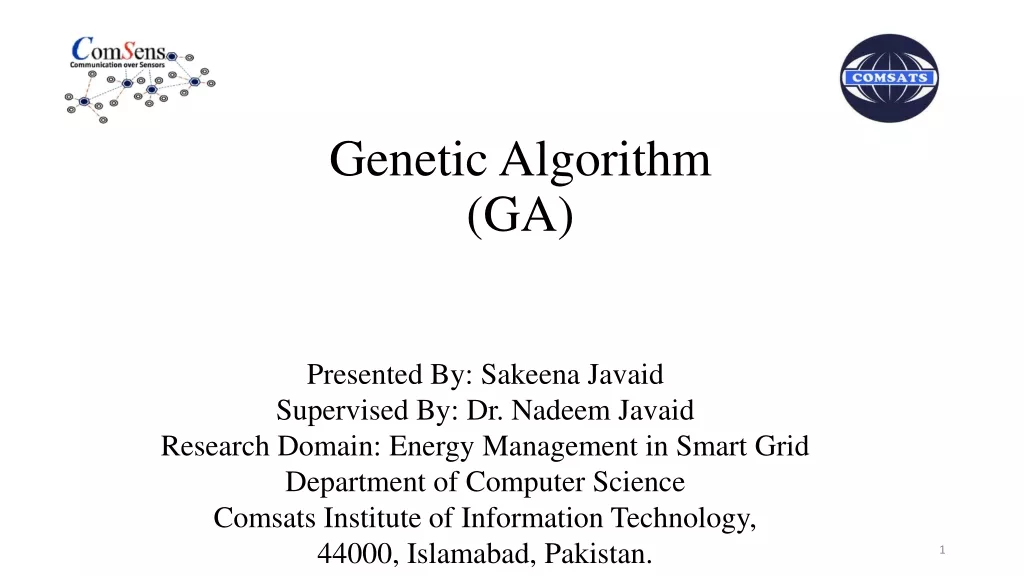


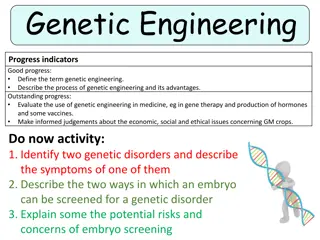



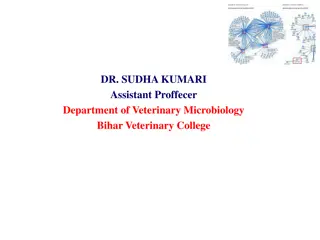

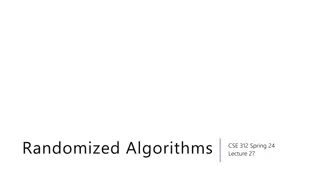
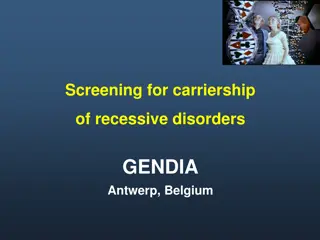




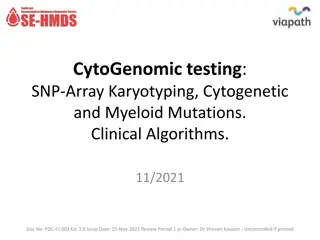
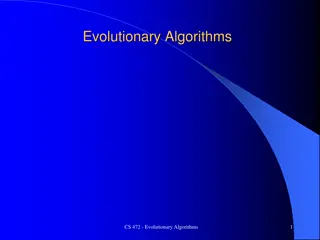


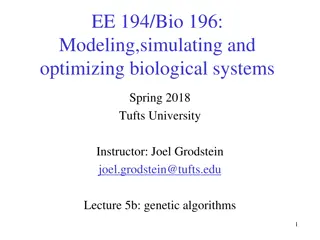


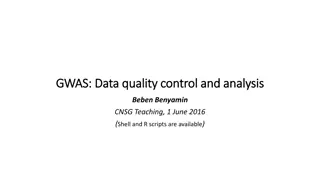
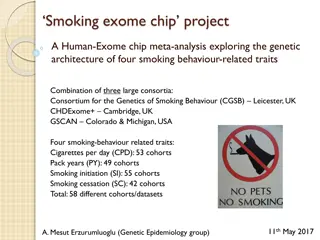

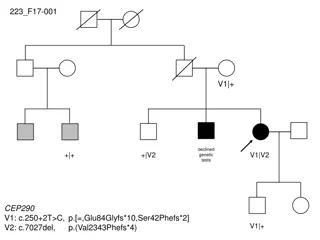
![BCH 462- Biotechnology & Genetic engineering [Practical]](/thumb/273367/bch-462-biotechnology-genetic-engineering-practical.jpg)
